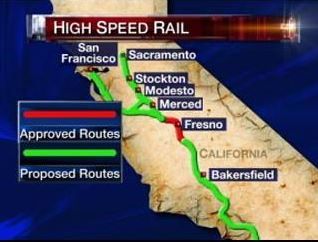Secrecy, deception: CA bullet train follows path of Big Dig
by Chris Reed | January 23, 2014 6:30 am
 [1]One of the defining characteristics of a government boondoggle is secrecy. Boondoggles are much less likely to come to pass if early scrutiny reveals huge problems.
[1]One of the defining characteristics of a government boondoggle is secrecy. Boondoggles are much less likely to come to pass if early scrutiny reveals huge problems.
This was illustrated perfectly by the “Big Dig” — the Boston tunnel and road building project that was the most expensive of its kind in U.S. history. This is from the banner story in the Boston Globe on Sunday, April 9, 2000 — long after the local, state and federal governments had sunk billions of dollars into the project:
“Big Dig managers have systematically covered up hundreds of millions of dollars in cost overruns for years through shell-game accounting that made public estimates for the road-and-tunnel work little more than a mirage.
“While state officials insisted the project was on time, on budget, and tightly managed, a two-month Boston Globe investigation found little of that was true.
“The Globe’s investigation revealed the project has been hemorrhaging money since early 1998 and that its work schedule has slipped so badly it will take as much as a year longer to complete than publicly acknowledged.
“Its management has failed to hold contractors to their bids, or to penalize them for mistakes, resulting in massive cost increases that are still growing. At the same time, managers have been dropping expenses and adding dubious credits to artificially balance the books.
“Until recently, voters, investors, and taxpayers had been assured that the most expensive roadwork in US history was cruising along smoothly. But officials — led by James J. Kerasiotes, the project’s top man — have persistently withheld evidence, turning the Big Dig’s budget into a numerical charade. …
“Federal officials are preparing to release an audit this week that is expected to show the Big Dig’s cost could reach $13.6 billion — $2.8 billion more than projected just six months ago.”
Ridiculous stonewalling from bullet-train officials
Are similar shenanigans going on behind the scenes at the California High Speed Rail Authority? Authority-watcher Kathy Hamilton, writing at examiner.com[2], makes a powerful case that when it comes to openness, the bullet train is Big Dig the Sequel:
“Attempting to get information from the High-Speed Rail Authority (HSR) is like pulling teeth since they often delay or refuse to give information when it may be detrimental to the project.
“The California Public Records Act[3] requires state agencies to disclose records and to assist the public in finding the information they need. There are very few, narrowly defined exceptions and it is guaranteed by the state constitution.
“But with the High-Speed Rail Authority, whether they release the information or not depends on who you are and what you are asking for. Here are various responses one can expect when asking for information from the rail authority.
“· It’s draft, you can’t have it
“· Narrow down your request, it’s too broad
“· We need time to find it (the more delayed the better)
“· We have to mail it to you, files are too big
“· It’s a trade secret
“· Client/Attorney Privilege
“· You get some documents but the attachments are missing
“· You can’t have the record because the public interest served by not disclosing the record clearly outweighs the public interest served by disclosure of the record.
“· We need clarification, which ends up taking a lot of time. An actual example: They have asked the requestor what does the word ‘communication’ means.
“· It doesn’t exist.”
Do you have any doubt that if the CHSRA was actually open we’d see exposes like the Boston Globe’s on the Big Dig?
Me, neither.
As horrible as the project has been, it’s probably far, far worse than we’ve managed to find out.
- [Image]: http://calwatchdog.com/wp-content/uploads/2013/08/high-speed-rail-map-320.jpg
- writing at examiner.com: http://www.examiner.com/article/california-hsr-violating-the-public-records-act-deception-or-incompetence
- Public Records Act: http://www.examiner.com/topic/public-records-act
Source URL: https://calwatchdog.com/2014/01/23/secrecy-deception-bullet-train-follows-path-of-big-dig/